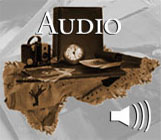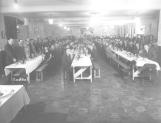1
ZenithKirkland Lake, unlike many communities in Canada, was relatively prosperous during the 1930's because of its gold mining industry.
2
The strength of the gold mining industry was bolstered by the new gold standard set by the U.S. Government in 1933 and the commitment by the Canadian Government to purchase gold at that price. This meant that there were jobs in Kirkland Lake when other places had none. This situation continued until late into 1941.4
The zenith, occurred because Franklin Roosevelt increased the price of gold to $35 per oz. and the, that was the beginning of the peak and the strike was the beginning of the end.5
The North booms in the 1930's11 July 1980
Kirkland Lake, Ontario, Canada
 Credits:
Credits:Courtesy of the Ontario Jewish Archives
6
S. Speisman: First of all that? when things were lousy down here during the depression, they were really booming?I mean, the thirties was the peak time say in Kirkland?F. Schaeffer: Kirkland, Timmins, the gold mines?They were hiring, probably one of the few industries in the country that was hiring people and the Jews certainly prospered?certainly prospered in every one of these communties...
8
And that you are quite right, it reached its zenith in the late thirties, at one time on a Saturday night in Kirkland Lake you could not walk on the sidewalk. So many people going back and forth. Truly unbelievable. And we lived on the main street, on Government Road - and we would, my sister and I, would get out of bed and look out the window and because we had that frontage where people could sit on the cement walk in front of the house. It was always packed. There were always people . . . hundreds, thousands of people.9
Joe Atkin's Bar Mitzvah. The community is at its height at this time.1949
Legion Hall, Kirkland Lake, Ontario, Canada
 Credits:
Credits:Photograph courtesy of Eddie Duke
10
(Marlene noted, "Photograph taken in the Legion Hall in Kirkland Lake on the corner of Main and Government Road, when it was upstairs.") Yeah well the reason, the reason that it was taken there was at that particular time the synagogue was under construction. It had not been, been built yet. It wasn't finished. And uh, the synagogue is in, this party is in honour of Max Kaplan's son. And the thing that is very interesting about this photograph is that this is probably, the community was at its height when this was done. Uh, this represents the whole Jewish community of Kirkland Lake with probably quite a few guests from Timmins as well and Rouyn. Not too many but there were some guests that came for that event.12
F. Schaeffer: The Jews of the North felt themselves a community quite apart from the south.S. Speisman: Right.
F. Schaeffer: They do not even recognize?
S. Speisman: That's right
F. Schaeffer: They considered themselves as a community. They did look at themselves as a community maybe because of the joint cemetery. They really existed as a totally self-sufficient community in every way. The rabbis were their shochtim also. They really were totally independent during the twenties, thirties, and even the forties. In the fifties, I know my mother-in-law used to get her meat shipped from either Winnipeg or the south. But, for many years they were just a group unto themselves.
14
S. Wertman: There is one member of the family who was not brought over, who was left there, who had children and they were getting married and they were. . . That was before the war. You know? before Hitler began taking over.It is very sad. I remember I was only, God?I do not know if I was a teenager. I was quite young. But I had that letter and I have my father's file. And I gave that letter to my sister and she had it translated.
And this, these begged . . . on my mother's side of the family, begged my father to send money to bring her over. He could not do it.
R. Ormerod: Yea.
S. Wertman: I . . . you know - terrible. They did not survive. We knew all about what was going on there. When the war started and my mother died in 1939. That was the year the war started. Right?
We know what was happening to the Jews, in Europe. It is not as if we did not know. And as you say, you feel you are in a safe haven here. I did not feel anti-Semitism when I was young, at all.
R. Ormerod: Ok.
S. Wertman: And I was not really aware of it much. We are all aware of the fact that the Jews were being . . . killed.
R. Ormerod: Yes
S. Wertman: Hitler . . .well Don's brother joined service, Don joined the service, Eddie joined, David was over in Europe. So, everybody did their thing.